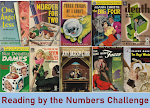 Dead Man's Riddle by Mary Kelly (1957) is the second of her Inspector Brett Nightingale mysteries. Here, Nightingale is in Edinburgh on holiday for the purpose of spending time with his wife Christina and hearing her song recital. Christina is an opera singer who works in Germany, so the couple spends very little time together. But Nightingale no sooner arrives than he finds himself on a busman's holiday and at odds with his wife, who is none too pleased that his work may ruin their holiday together. He stops in to see a friend at the local station who introduces him--as a "matter of courtesy"--to Inspector Gower. Gower is in charge of the university town's latest crime--the murder of Dr. Seiffert, a visiting Professor of German at Edinburgh University.
Dead Man's Riddle by Mary Kelly (1957) is the second of her Inspector Brett Nightingale mysteries. Here, Nightingale is in Edinburgh on holiday for the purpose of spending time with his wife Christina and hearing her song recital. Christina is an opera singer who works in Germany, so the couple spends very little time together. But Nightingale no sooner arrives than he finds himself on a busman's holiday and at odds with his wife, who is none too pleased that his work may ruin their holiday together. He stops in to see a friend at the local station who introduces him--as a "matter of courtesy"--to Inspector Gower. Gower is in charge of the university town's latest crime--the murder of Dr. Seiffert, a visiting Professor of German at Edinburgh University.Gower sees Nightingale as Scotland Yard's answer to prayer and Nightingale can't help but be intrigued. The case is a difficult one and Gower has just been thinking that he would need to ask for official assistance. The murder had taken place during the school's Rectoral election, a night when students run amok dressed in animal heads, divided into factions, dumping water on one another, setting fire to anything of little value that might be hanging about, throwing fish at each other (???), and generally causing mass confusion throughout the university grounds. Who's to say that the murderer didn't take advantage of the melee, don a red fox head or a blue boar head and sneak into the library where the dead man was found?
There are few clues to be had, though there are a few. There's the missing key (really an iron bar of sorts) to one of the water tanks, the strange rune symbols among the dead man's papers, the man's connections with Germany, and the rumors of his affair with another man's wife. There is also the recurring theme of the red fox and the blue boar. But none of these clues seem to lead anywhere until Nightingale sees a connection between symbols and Germany and his friend Alec sees a connection between Christina's music and a code. There is more at at stake than any of them guesses and for Nightingale it may cost him the woman he loves most.
There are several things to like about this book. First, and foremost for me, is the academic connection. Kelly does an excellent job setting the academic scene. The opening chapter with the students in full cry during their Rectoral revels makes vivid use of the university setting and the undergraduate climate of the times. The university provides an excellent backdrop and the professors--if my real-life experience of the breed is anything to go by--ring true. I do love a good academic murder...or two. And it's always a delight to discover a new one by an author I've not encountered before--which is definitely the case here. I have found very little on Mary Kelly on the web. She is a British crime novelist born in 1927 and has three novels featuring Inspector Nightingale as well seven other crime novels, including The Spoilt Kill which won the CWA's Golden Dagger Award in 1961. Her (very) brief author's blurb on the dust jacket of my edition also tells us that "her great interests are music and opera" which explains the great role of music in this story.
The mystery itself is interesting and I enjoyed watching Nightingale at work (with reservations--discussed in a moment). His deductions are sound and he works within the clues provided with perhaps one minor moment of inspiration that seems to come from nowhere. I may have missed a clue, however, so let's give him the benefit of the doubt. It's obvious that Kelly has produced a good policeman. My reservations involve Nightingale personally. He seems intent on rubbing absolutely everyone--including his wife--the wrong way. People tell him things and I can only suppose that they do so out of irritation and in hopes that he will leave them alone. It would be wrong to say that he's a horrible man--he's not. But I don't understand the motivation behind his attitude. It's possible that the background information necessary to understand what makes him tick was given in the first novel, A Cold Coming, but given how little she explains about Nightingale's relationship with the people he knows at Edinburgh, I doubt it. She seems to take for granted that the reader will understand what Nightingale means when he drops certain phrases referring to his relationship to Alec, for instance. And his relationship to his wife baffles me. I get the idea that they have been married for quite some time, but he (and she, to be honest) behaves as though he knows very little about her. It's quite odd.
Overall, a solid mystery with plenty of elements to keep the reader interested. I would like to find the other two novels in the Nightingale books to see if I can make any sense out of his personal behavior. ★★★ and a half.
***************
This counts for the "Any Other Animal" on the Golden Vintage Scavenger Hunt card. This is also my first offering in the 1957 edition of Rich's Crimes of Century over at Past Offenses. If you have any 1957 crime fiction hanging out on your shelves, then come join us!






























1 comment:
Sounds like a well-thought out book.
Post a Comment